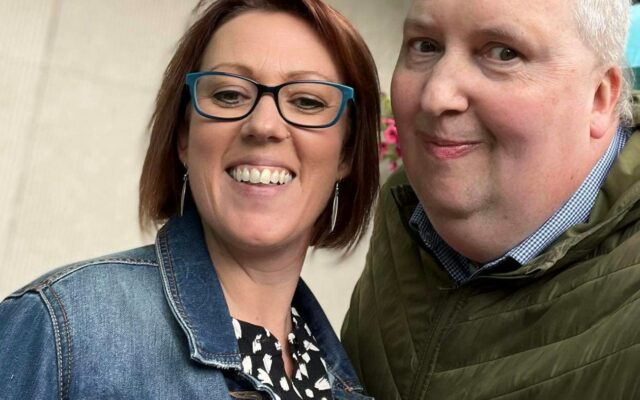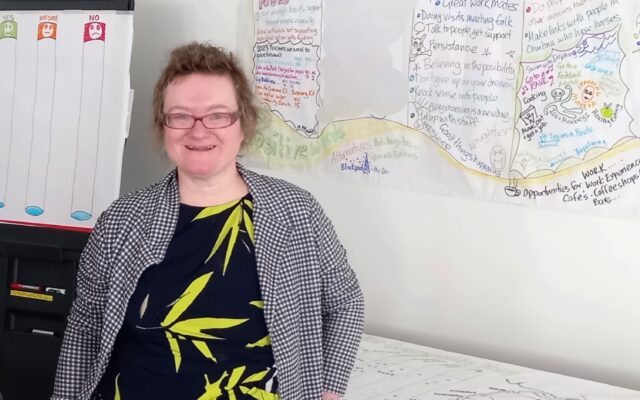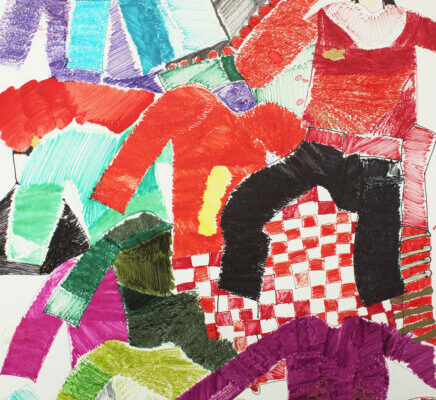 Paul Richards has already started and run several successful projects, notably the Stay Up Late Campaign. Now he has another project, Gig Buddies, which has really taken off, as he told Seán Kelly
Paul Richards has already started and run several successful projects, notably the Stay Up Late Campaign. Now he has another project, Gig Buddies, which has really taken off, as he told Seán Kelly
“We are calling this our vision for the Gig Society! I know it’s a terrible pun, but we are doing it in spite of the Big Society because it is how communities should behave”. Paul Richards is speaking about Gig Buddies. You may know Paul as the bass player of Punk Legends’ ‘Heavy Load’, or as the Director of the Stay Up Late Campaign and Charity, or most recently you may know him from promoting Gig Buddies, a Stay Up Late project.
I met Paul in Brighton and it turns out to be an interesting time for him and the project. On the one hand some of Gig Buddies’ core funding has been cut by East Sussex. Only recently this would have meant the end of the project but there are now plans to work with partners to develop up to 20 new Gig Buddies projects on a social franchise basis. Paul seems to have a calm and even philosophical approach to the whole thing. It occurs to me that he is a rather Zen Punk!
Rock ’n roll
How did it all start? The answer as you might expect has everything to do with rock ‘n roll. Paul was originally a support worker for Southdown Housing in Brighton. Jim, a guy with learning disabilities, had started a band. The first bass guitarist left and Paul, who didn’t play bass but, just like Noel Redding with the Jimi Hendrix Experience, or Kim Deal with the Pixies, took it up because he wanted to join the band.
Three members of the band had learning disabilities and two did not. Paul says, “There weren’t any other bands around like us at the time”. The band soon got a residency at the Blue Camel, an ‘inclusive club’. Paul says that at first he was unsure. “I was in another band and rehearsing three times a week. Heavy Load was just this out-pouring of sheer joy and bedlam! It took me a little while to adjust. We realised we were just having such great fun. I suppose that’s the moment you just embrace that chaos and think this is great”.
The band played at the Beautiful Octopus Club and other disability and inclusive clubs. Then Jerry Rothwell made a movie about them. “He followed us around for two and a half years. I didn’t believe it was ever going to happen and still, looking back on it, I can’t quite believe it did”.
From low-key beginnings Heavy Load went on to play in Berlin, New York, Denmark, a squat in Copenhagen and twice at the Glastonbury Festival.
They were commissioned to write the theme tune for a Channel 4 programme called Cast-Offs. Paul met the producers in a hipster café who told him, “We want noise, anarchy, chaos. Music like you don’t hear on TV normally’. I said, “Yes, we can do that”. One of the producers said, “I love your can-do attitude”. I said, “Well, you’ve just sort of described what we can do. If you’d asked for anything else…”. Heavy Load found themselves with a day in the studio to record just 19 seconds of music. “So it was, right lads, let’s knock this out as quickly as possible because then we’ll record our next album during the rest of the day”. Which is just what they did.
The band dissolved in 2012. “Michael the drummer said I’m 50. I want to retire”. It seemed to be a good time for everyone to call it a day and they ended with a gig in Trafalgar Square as part of the Olympics celebrations.
Taken root
Meanwhile, Stay Up Late had already taken root. Paul says the band had always realised that by the time they went on stage many members of the audience had gone home. They knew that people had to go home with their staff because shifts were coming to an end and it was time for ‘handover’. Paul jokes that they were pleased to know that it wasn’t the quality of the music that was sending people home. Heavy Load briefly took to asking if the band could go onstage and play earlier in the evening. “But we soon stuck to our guns and went on later, even if we were playing to no-one. We were a punk band!”
A crystallising moment came after Heavy Load did a mainstream gig in a regular music pub with two other mainstream bands. The band was concerned about how they would be received and to start with the audience were like, “What the …??”. But by the end everyone was converted, singing along and linking arms. For the band it was a great achievement. “Afterwards we were all having a drink and a chat, a post-gig post-mortem. Michael had half a pint of beer left and his support worker came up and said, ‘Come on, drink up, it’s time to go home’. That was the moment that Stay Up Late started”.
Paul emphasises that people don’t have to stay up late. “I always say we don’t care what time people go to bed but we do if they have no choice”.
Is it working? Are people staying up late? “At the moment if I am honest I would say it is probably not working. We are facing the biggest challenge yet with the cuts”. But he points out that the problem of people going home at 8.30pm existed when the movie was made in 2006, two years before the global crisis. He says there has been a failure of people, including commissioners, to deconstruct the current system and replace it with something better.
It has also been hard to get through to staff. “There is a hard core of people who get it but a majority of support workers are just going along with the system”. Radical change is the solution he would like see: “They say that making cultural change is like trying to stop a super tanker. Well, you can do that if you use torpedoes!”
What has changed, Paul thinks, is that the campaign has increased discontent with the current state of affairs. He quotes a recent survey in Hertfordshire. “They did this surprise audit at 8.30 in the evening. Social workers went round to see what was going on and 61 per cent of people were ready for bed. Calderdale did the same thing and got the same results”. Stay Up Late did their own survey of nearly 200 people which shows better results, not so surprising perhaps since many respondents might well be supporters of the campaign. Nearly three quarters of people with learning disabilities who responded said that they could stay out after 10pm (48 per cent with support and 24 per cent who didn’t need support). Depressingly, however, the great majority of respondents said they knew other people who could not stay out after 10pm. Paul says he hopes that Stay Up Late is making this nasty boil bigger. “With all this discontent maybe it will burst!”.
Positive focus
Paul is keen to keep a positive focus and for the campaign to shine a light on where people have got it right. He cites Gettalife, a small organisation which will provide 24-hour cover with three people doing long shifts which means they can support the person doing whatever they want to do, whether it’s sleeping or going out.
The Stay Up Late campaign led almost inevitably to Gig Buddies. How could people stay up late? By having a friend with the same interests who would go out with them. Paul developed the idea at a Brighton conference looking at ideas to make the city better for its residents. Several hundred people attended and assisted in the development of 27 different ideas. Each one was given three minutes to make a pitch for funding. Paul gave the pitch about Gig Buddies – and won! After three days of hard work he says he went home absolutely shattered and his partner asked, “So how much did you win?” The answer was just £2,000, but it was a start. Southdown’s director Aideen Jones persuaded the Board of Trustees to award £5,000 so suddenly £2K had become £7K! Paul then managed to get some additional funding from East and West Sussex Councils and soon had enough to employ a member of staff part-time. Madeline started on two days a week. Now she is the full time manager and has an assistant and admin support. Stay Up Late has just passed its third birthday and there are now 70 successful matchings across Sussex.
Pauls says the matching is really important. It’s based on getting to know people and it’s not something you can do online with an app. People need to really share an interest. “It’s not just a dating agency without the sex”.
The new Gig Buddies projects will be developed through social franchising. This means that they will be run and funded independently and the current staff will provide the know-how. This should mean that the results will look quite different in different places, with different solutions based on local knowledge.
Meanwhile the whole project is being researched by RIPFA (Research in Practice for Adults). Paul feels the need for academic evidence to back his view that while the project looks like great fun it can also deliver some ‘meaty’ outcomes in terms of mental and physical well-being.
What’s your gig?
The project has also been widening its remit so it is not just about rock ‘n roll. The question, “What’s your gig?” can now encompass answers that include going to church, going for walks, photography and just about any other interest. One man with learning disabilities has been going with a buddy to visit Sussex chapels.
Meanwhile new Gig Buddies projects are threatening to break out all over. Paul expects ten new projects to start within the next year and that includes new projects s in Portsmouth, Scotland and even in Sydney in Australia.
Paul clearly has a restless appetite for change and development – who knows what this Zen Punk manager and his colleagues will come up with next?





